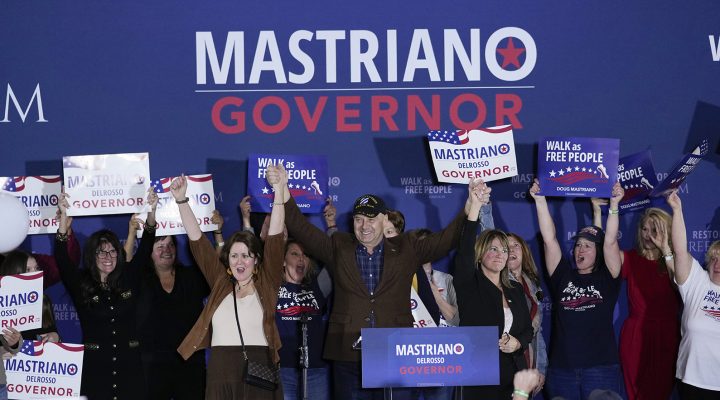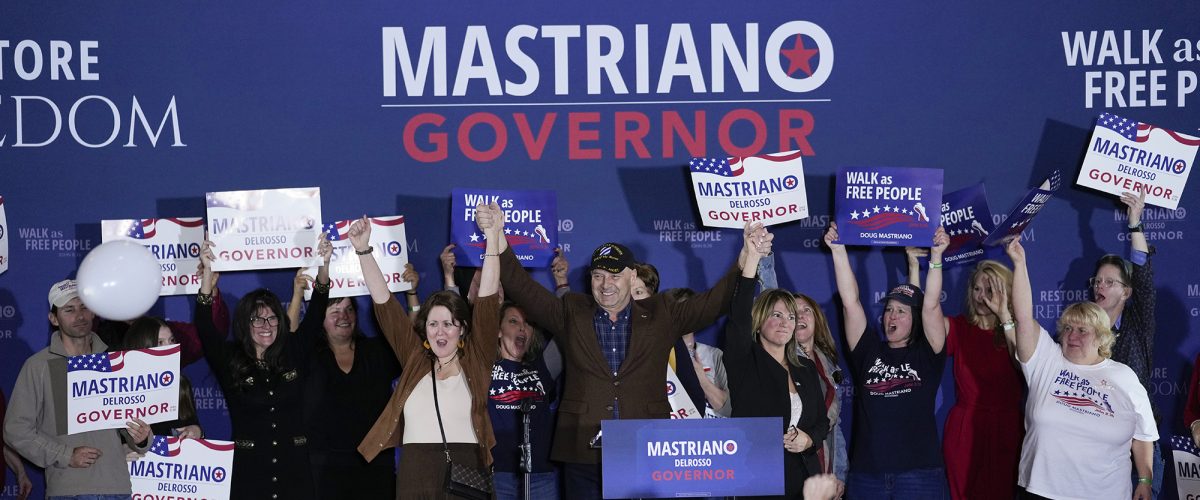Churches and individual Christians must become more ardent in their opposition to Christian nationalism in the wake of the midterm elections, according to John Dorhauer, general minister and president of the United Church of Christ.
“We must seek to engage progressive Christianity in a deep conversation about just what is needed to send these bigots and homophobes and misogynists back under the rocks out from which they crawled when the 45th president took office and brought their brand of Christianity back and put them in power,” Dorhauer said during a Nov. 9 webinar hosted by Faithful America, an online, ecumenical Christian community devoted to social action.
The midterm election briefing by progressives originally was scheduled to fall immediately after a similar briefing to be put on by conservatives, but that event got postponed by its sponsor, Faith and Freedom Coalition.
“With many of the election results still being calculated, including Senate races in Georgia, Nevada, and Arizona and a variety of House races, the Faith and Freedom Coalition’s press briefing has been postponed,” a press announcement said.
That briefing was to feature Ralph Reed, chairman of the Faith and Freedom Coalition and three other speakers. Not only was control of the U.S. Senate and House still undecided on Wednesday, but the “red wave” conservatives anticipated in the midterms did not materialize.
Playing catch-up
In the Faithful America briefing, Dorhauer said progressives have been playing catch-up to the aggressive political tactics of religious conservatives and it hasn’t been a fair contest.
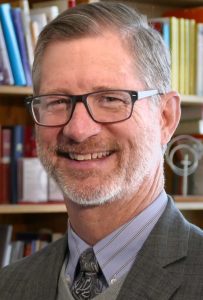
John Dorhauer
“The complacency and decorum characteristic of white Christian liberalism is not going to bring back the justice we seek,” he urged. “They’re playing tackle football. We’re playing touch (football). And we’re going to lose this game every damned time.”
The webinar, titled “Countering Christian Nationalism: What Comes After Ballots are Cast,” featured a panel of seven national faith leaders, a sociologist and a journalist assessing the effect of Christian nationalism on democracy and how the right-wing movement can be resisted ahead of the 2024 presidential election.
Participants also noted that many Republicans who denied the results of the 2020 election — which is a key attribute of Christian nationalists — won elections on Nov. 8. The New York Times reported that more than half of the 370 election deniers it counted were victorious, mostly in the U.S. House, with votes in some races still being counted.
Dorhauer said he urges clergy to use the pulpit to speak openly about Christian nationalism’s “perverse rebranding of Christianity to authorize violence in defense of a vengeful God.” Otherwise, the theology and politics of homophobia, misogyny, racism and xenophobia theology will continue to grow unchecked.
“We are losing this game to a violent, abusive crowd of Christian thugs willing to March into our nation’s capitol carrying crosses and assault weapons.”
“I was once naive enough to believe that good ideas, clearly articulated and well-reasoned … would be sufficient to keep liberty, human rights and democracy vital, healthy and relevant. And that’s what playing touch football looks like. We are losing this game to a violent, abusive crowd of Christian thugs willing to March into our nation’s capitol carrying crosses and assault weapons,” he said.
“We have to think very differently about how we enter the marketplace of ideas. We have to think very differently about the tactics being used by Christian nationalists. We have to think very differently about how effective they are in gaining the upper hand, controlling law and reversing hard-won gains in human rights.”
White rage and Black grief
Panelist Jacqui Lewis needed no prompting to take the gloves off against Christian nationalism and one of its biggest beneficiaries, former President Donald Trump.
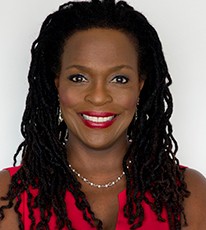
Jacqui Lewis
“I’ve been so alarmed at my fellow Americans who fell into a fascist trance these last years following Mr. Trump like a messiah anointed to heal the nation,” said Lewis, senior minister for public theology and transformation at Middle Church in New York City.
“For me, he’s more like the antichrist pointed to by the prophets in our traditions. He is not a good man. He wasn’t a good president. Yes, the economy bounced up for some, but he’s a liar, a false prophet, and the unquestioning devotion to him by significant numbers of white evangelical Christian Republicans, and by some people of color, too, has frankly frightened me. It smells of Mussolini and of Hitler. It smells of fascism and holocaust and apartheid.”
Most of all, it reeks of racism, Lewis said, adding that any faith-based campaigns against Christian nationalism must have anti-racism at their core. “Sitting in the midst of all of this foul rotting stench is white rage and the Black grief that results from it.”
“I’m so sick of living in a nation that treats Black grief like a threat and white rage like a sacrament.”
That’s why the Jan. 6 insurrection was tolerated much more readily than the Black Lives Matter protests over the murder of George Floyd, she said. “I’m so sick of living in a nation that treats Black grief like a threat and white rage like a sacrament.”
Lewis said there is hope in the diversity that Christian nationalists fear. “Yes, our nation is browning. Yes, it is more liberal. Women and queer people are gaining power. Black lives actually do matter, and good-old white boys clubs just are not as sexy as they used to be. They are being replaced with equity, diversity and complexity. The tactics of isolation are being replaced with collaboration and, by the way, hatred is being replaced with fierce love and organizing.”
But the cause requires focus, she said. “What we have to do is to make Black grief the center of our discourse. Yes, (Christian nationalism) is anti-trans and anti-women and anti-abortion, and its anti-freedom. But the core wound is white supremacy, and that has a particular target on the back of Black folks in America.”
Mastriano’s defeat significant

Andrew Whitehead
A candidate who exemplified the anti-democratic ideals of Christian nationalism was Doug Mastriano, whose unsuccessful bid for governor of Pennsylvania was imbued with culture-war rhetoric that included contempt for the separation of church and state, said Andrew Whitehead, a sociologist and co-author of Taking America Back for God: Christian Nationalism in the United States.
Mastriano “claimed that he was in the midst of a ‘holy battle’ and fighting the ‘forces of evil.’ This type of militaristic and apocalyptic rhetoric doesn’t lead to supporting democratic norms like counting every vote and respecting the outcomes of elections,” Whitehead said. “It’s a positive sign for democracy in the U.S. that a candidate like Mastriano, who wholly embraced Christian nationalism, lost.”
“It’s a positive sign for democracy in the U.S. that a candidate like Mastriano, who wholly embraced Christian nationalism, lost.”
But journalist Katherine Stewart added that the failure of the so-called “red wave” of Republican victories to materialize likely will harden and embolden the Christian nationalist movement.
“No one is going to get everything they want in the political arena, which is inevitable in a country as pluralistic and diverse as ours. But this kind of religious nationalism is likely to adopt an embittered and neolithic view of the world, which can lead to greater radicalization,” said Stewart, whose books include The Power Worshippers: Inside the Dangerous Rise of Religious Nationalism.
Vigilance needed
Advocacy organizations must be on the lookout for upticks in misinformation or even violence in the wake of Republican defeats, said panelist Joan Neal, deputy executive director and chief equity officer of the NETWORK Lobby for Catholic Social Justice.
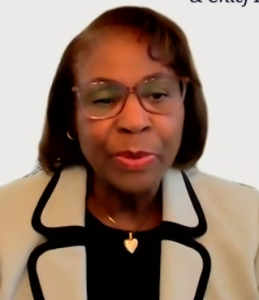
Joan Neal
“It remains to be seen if these people will accept the election results. But if past is prologue, it is a good bet that some percentage of the American population will not only refuse to accept the election results but will resort to post-election violence and intimidation of election administrators in an attempt to force the country to bend to their own will.”
Such reactions will come in the name of faith and the belief that Americans with alternative viewpoints are enemies of the nation and God, Neal said.
“We are not out of the woods yet because now is the time when we must be hypervigilant. We do not know the final outcome of all the races across the country … so we must guard against the spread of disinformation and misinformation, false claims of victory and violence that can so easily erupt if the final results are not what some people want.”
Some showed up
But Election Day itself offered evidence of the kind of faith-based action that can push back against Christian nationalism, said panelist Jennifer Butler, a Presbyterian minister and founder in residence of Faith in Public Life.

Jennifer Butler
“Thousands of faith leaders across this country showed up at polling locations to help serve as peacekeepers and to ensure that everyone could cast their votes free from intimidation or violence,” said Butler, author of Who Stole My Bible?: Reclaiming Scripture as a Handbook for Resisting Tyranny. “Clergy and faith leaders across faith and race and place worked together to help our neighbors vote and to make sure that those who use intimidation, deception and violence, and service to white supremacy, did not have the last word.”
Butler said those ministers’ actions hopefully embody a wider movement “to root out and condemn Christian nationalism in every place and build a multifaith, multiracial democracy where everyone thrives.”
‘Pay attention’
But progress against this “election-denying, insurrection-defending, democracy-downgrading movement” will require a commitment by churches, politicians and others to engage with those who hold Christian nationalist views, said Doug Pagitt, executive director of Vote Common Good.

Doug Pagitt
“Our effort is to try to call people to a greater level of engagement and empathy, to know one another, to listen to each other. We are trying to get church leaders to pay attention to the Christian nationalist church leaders around them. We want politicians to pay attention to the Christian nationalist politicians who serve with them. We need to listen to each other because Christian nationalism has to go, and the only way it’s ever going to go is when we recognize that it’s a harm to the well-being of the people in this country and likely to the world and the planet itself.”
Churches can help by creating “safe spaces where people can talk about these things, where they can engage in conversations about faith and politics. It’s really more of a decision to open up those spaces and to engage in it and it’s time for us to break the no-talk rules,” Pagitt said.
Example of Jesus
Sojourners President Adam Russell Taylor said Jesus can be activists’ guide in opposing Christian nationalism. “We can turn to Jesus who, through his teachings and actions, rejected both nationalism as well as imperialism, and instead chose the path of service and of justice, particularly to the outcast and the marginalized.”

Adam Russell Taylor
Christian nationalism runs counter to the “radical inclusion and love ethic” Jesus exemplified in his ministry, Taylor said. “Our nation does have a stark choice to make, as does the church, and now is the moment for us to work together to provide a compelling counter vision to Christian nationalism, which I think is the vision of the beloved community.”
The next phase of the campaign against Christian nationalism must begin immediately by the proper counting of every vote, said webinar host Nathan Empsall, an Episcopal priest and executive director of Faithful America.
“We are sick and tired of the attacks on democracy and on one another that occur in our faith’s name,” he declared. “Election officials must count every vote. No more Christian nationalist hijacking of our religion for conspiracy theories and false witness. Valid election results must be accepted and all efforts to overthrow the will of the voters, especially through political violence wrongly done in Jesus’ name, must be rejected.”
Related articles:
Surviving this election season and repenting of idolatry | Opinion by Marv Knox
Trump’s toxicity: A first take on the midterm elections | Opinion by David Gushee
Moderates are an endangered species in the pews, but they aren’t completely extinct at the ballot box | Analysis by Laura Ellis

